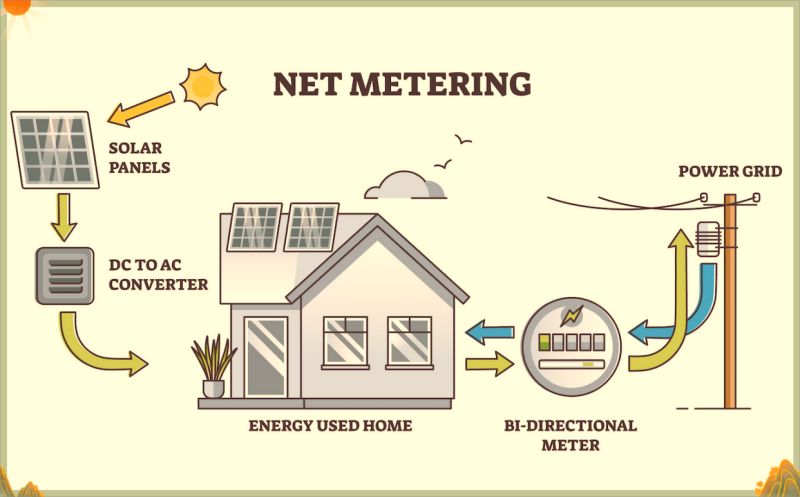Net metering works differently for on-grid and off-grid solar energy systems:
Grid-tied solar energy system:
Generation: A grid-tied solar energy system is connected to the electric grid, allowing it to generate electricity using solar panels.
Consumption: The electricity generated by the solar panels is first consumed onsite to power the electrical loads of the property where the system is installed.
Excess generation: If the solar panels generate more electricity than the property consumes, the excess energy is sent back to the grid instead of being stored.
Net Metering: Net metering is a billing arrangement with the utility where excess electricity exported to the grid is credited back to the owner’s account. This means that if the solar panels produce more electricity than is consumed, the owner receives credits that offset future electricity bills.
Billing: The utility company measures the electricity consumed and the electricity exported to the grid separately. The owner is then billed only for the net energy consumed (consumption minus exports), plus any applicable fees or charges.
Off-grid solar power system:
Generation: An off-grid solar energy system is not connected to the grid. It generates electricity using solar panels and stores it in a battery bank or other energy storage system.
Consumption: The electricity generated by the solar panels is used to power the electrical loads of the property where the system is installed. Any excess energy beyond what can be stored is typically wasted.
Storage: Excess power generated during peak production periods is stored in batteries. The stored energy is used during periods of low or no sunlight, such as at night or on cloudy days.
System sizing: Off-grid solar energy systems must be appropriately sized to meet the energy needs of the property, even during extended periods of low solar availability. This requires careful planning and consideration of energy usage patterns and load requirements.
Backup Power: To ensure uninterrupted power, off-grid systems may include a backup generator or other power source for use when solar energy production is insufficient.
In addition to the information above, there are a few key considerations to keep in mind when it comes to net metering:
Grid connection: Grid-tied systems require a connection to the local electrical grid. This connection allows for the export and import of electricity between the solar system and the utility grid. Off-grid systems, on the other hand, do not require a grid connection because they are designed to operate independently.
Metering setup: To accurately measure the electricity consumed from the grid and the electricity exported back to the grid, on-grid systems typically use separate meters. One meter measures the energy consumed from the grid, while another meter records the energy exported to the grid. These meters provide the necessary data for both billing and crediting purposes.
Credit rates: The rate at which excess power is credited back to the owner’s account can vary depending on utility and regulatory policies. The credit rate may be set at the retail rate, which is the same rate the owner pays for electricity consumption, or it may be set at a lower rate called the wholesale rate. Understanding credit rates is essential to accurately estimating the financial benefits of net metering.
Interconnection agreements: Before installing a rooftop solar system and participating in net metering, it is important to review and comply with the interconnection requirements and rules established by the utility. These agreements outline the technical specifications, safety measures, and other conditions for connecting the solar system to the grid.
Net metering is a beneficial arrangement that allows solar system owners to offset their electricity bills by exporting excess power to the grid. It encourages the use of renewable energy sources such as solar power and promotes a more sustainable and environmentally friendly energy system.
Post time: Sep-15-2023
